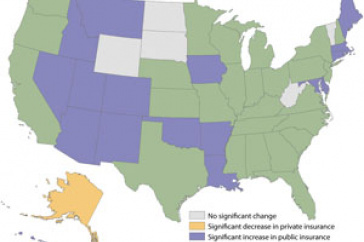Carsey Institute: Lack of Jobs, Population Decline Seen as Most Pressing Problems Facing North Country

Change in Children's Health Insurance Coverage Type, 2008-2009
DURHAM, N.H. - A lack of jobs and a declining population are considered the most pressing problems facing the North Country by the residents of Coos County, who increasingly favor using natural resources to create jobs instead of for conservation, according to new research from the Carsey Institute at the University of New Hampshire.
"Challenges stemming from the economic restructuring of the past decade have been deepened by the most recent recession, and issues of limited economic opportunities, financial hardship, and population decline have become more pronounced. Given these trends, it is not surprising that residents' priorities have shifted toward job creation rather than the conservation of natural resources," the researchers said.
"However, the extent to which North Country residents remain attached to their communities in the face of this economic context is noteworthy, as is the robustness of civic culture in the region's communities. In Coos County, recreation and tourism are seen as crucial for the area's economic future. At the same time, residents also value traditional forest-based industries like logging, and to a slightly lesser extent the development of renewable energy resources, reflecting the crucial point of transition at which the region finds itself," they said.
Carsey researchers surveyed residents of Coos County, N.H.; Oxford County, Maine; and, for the first time, Essex County, Vt., as part of the ongoing Community and Environment in Rural America (CERA) study. The responses of more than 1,800 residents detail their perspectives on their communities, including the extent of economic and environmental concerns, as well as levels of social cohesion and outlooks on the future.
The key findings of this research show:
- Coos County residents remain highly concerned about the lack of economic opportunities in the region, and concern about population decline has increased in recent years.
- As the loss of forest-based jobs has continued, support for using resources to create jobs has increased, while perceptions of conservation laws have become less positive.
- Despite declining economic circumstances, most Coos County residents plan to stay in the region and remain attached primarily to its quality of life, natural beauty, recreational opportunities, and proximity to family.
- Levels of trust and cohesion remain high, though confidence in local government has waned since 2007.
- Coos County residents see the economic future of their communities primarily tied to both recreation and traditional forest-based industries, though residents have become somewhat more polarized with respect to levels of support for economic development versus environmental protection.
- North Country residents see the encouragement of new business as a greater priority than preserving the traditional character of their communities.
"As the North Country moves into the future, one of its primary challenges will be working out a balance between what can sometimes be conflicting demands on the region's substantial natural resources. Further change in these dynamics, as well as in the circumstances of the region's residents, is certain to unfold in the years ahead," the researchers said.
The complete report about this research, "Continuity and Change in Coos County," is available at http://www.carseyinstitute.unh.edu/CarseySearch/search.php?id=169.
The Carsey Institute conducts policy research on vulnerable children, youth, and families and on sustainable community development. The institute gives policy makers and practitioners the timely, independent resources they need to effect change in their communities. For more information about the Carsey Institute, go to www.carseyinstitute.unh.edu.
The University of New Hampshire, founded in 1866, is a world-class public research university with the feel of a New England liberal arts college. A land, sea, and space-grant university, UNH is the state's flagship public institution, enrolling 12,200 undergraduate and 2,300 graduate students.
-30-
Editors and Reporters: Chris Colocousis, faculty fellow at the Carsey Institute and assistant professor of sociology at James Madison University, can be reached at mailto:colococr@jmu.edu"
Latest News
-
July 2, 2024
-
June 18, 2024
-
June 18, 2024
-
May 17, 2024
-
May 14, 2024

















































